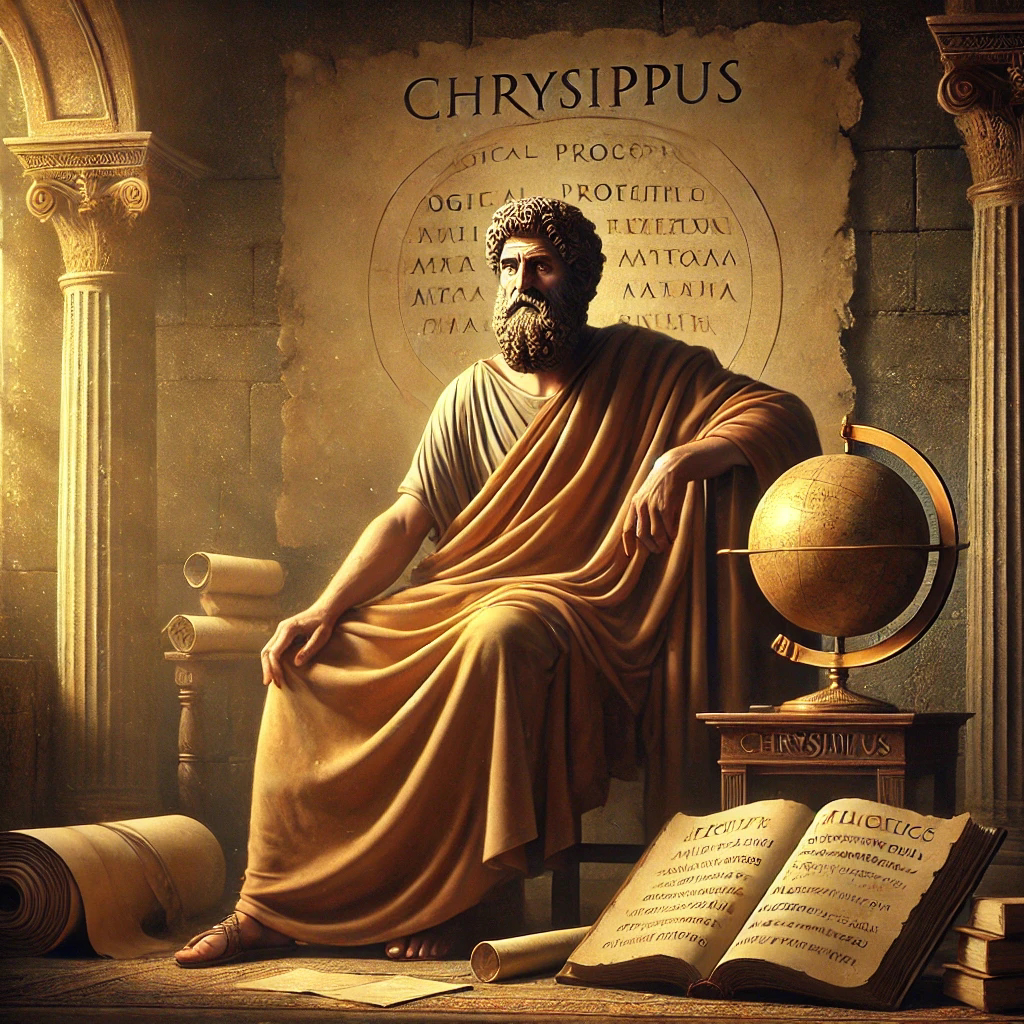If you’ve ever heard someone say, “It’s not events that disturb us, but our interpretation of them,” you’ve encountered a core Stoic principle. But did you know this mindset owes much of its refinement to a man named Chrysippus?
Chrysippus of Soli (c. 279–206 BCE) wasn’t just any Stoic philosopher—he was the philosopher who systematized Stoicism into a rigorous, logical framework. Without him, Stoicism might not have survived as we know it today. He took the teachings of Zeno (Stoicism’s founder) and Cleanthes (his predecessor) and sharpened them into a philosophy that was not just practical but nearly unassailable in logic.
Let’s break down what he believed, how he thought, and why his influence still lingers in modern thought.
1. Logic: The Backbone of Everything
Chrysippus was obsessed with logic. Not the kind of logic that just helps you win debates, but a structured way of thinking that underpinned ethics, physics, and human behavior.
He believed that all reasoning should be airtight—no room for sloppy thinking. His work on propositional logic laid the groundwork for what we now recognize in modern logical reasoning.
The Basics of Chrysippean Logic
Instead of focusing on syllogisms (like Aristotle, who structured arguments around categories—e.g., “All men are mortal; Socrates is a man; therefore, Socrates is mortal”), Chrysippus focused on propositional logic, which deals with statements that can be either true or false.
He developed if-then statements that resemble modern Boolean logic:
- If it is day, then it is light outside.
- If virtue is good, then we should pursue virtue.
This was groundbreaking at the time. Instead of categorizing things, he structured his logic around truth conditions, which paved the way for formal logic and the foundations of computer science today.
Why Does This Matter?
Because this kind of logic is what governs how we construct valid arguments today. His work was a precursor to what we now see in mathematical logic, AI programming, and even legal reasoning. If you’ve ever encountered a well-structured argument in philosophy or law, you’ve felt Chrysippus’ influence.
2. Fate, Free Will, and the Cosmic Web
Chrysippus was a determinist. He believed that everything happens for a reason—not in a mystical way, but in a logical, causal chain of events.
But he also refused to throw out moral responsibility. His view can be summarized as follows:
- Everything in the universe follows a chain of causes.
- That doesn’t mean humans are puppets—we still make choices.
- Our choices themselves are also part of this cause-and-effect chain.
The “Rolling Cylinder” Thought Experiment
One of his most famous analogies is that of a cylinder rolling down a hill:
- The push that sets it in motion represents external events (fate).
- The way it rolls (its motion) represents your nature and choices.
In other words, you don’t control the push, but you do control how you roll.
This was Chrysippus’ way of reconciling fate with free will. You are influenced by external forces, but your inner nature determines your response. Sound familiar? It’s the foundation of modern cognitive-behavioral therapy (CBT)—you can’t control everything, but you can control how you respond.
3. Ethics: Virtue is the Only Good
Chrysippus took the Stoic belief that virtue is the only true good and vice is the only true evil and turned it into a robust ethical system.
What Does This Mean?
- Health, wealth, and status? They’re neutral.
- Pain, suffering, loss? Also neutral.
- The only thing that matters? Your character and how you act.
Chrysippus argued that while external things (money, power, pleasure) might seem good or bad, they only have value in relation to virtue.
For example:
- Wealth can be good, if used virtuously.
- Suffering can be good, if it builds resilience.
His idea was that external events don’t define you—your reaction to them does.
This is why modern Stoicism is so resilient. In today’s world, where uncertainty is everywhere, Chrysippus’ view reminds us that external chaos means nothing unless we let it define us.
4. Physics and the Universe: A Living, Rational Organism
Chrysippus saw the universe as a single, rational organism governed by logos—a divine reason that organizes everything.
What Did This Look Like?
- The universe is alive, structured, and rational.
- Everything happens according to natural laws (fate).
- Humans, as rational beings, should align with this natural order.
This belief led to the Stoic practice of accepting fate—not passively, but as an active agreement with nature. It’s why the phrase “amor fati” (love of fate) is often associated with Stoicism.
5. Why Does Chrysippus Still Matter?
Chrysippus was the intellectual architect of Stoicism. Without him, the philosophy might have died out as a fringe school. His contributions—especially in logic, ethics, and determinism—influenced not just later Stoics (like Epictetus and Marcus Aurelius), but also modern philosophy, psychology, and even computer science.
Think about it:
- His logic anticipated modern mathematical and AI reasoning.
- His ethics inspired cognitive-behavioral therapy (CBT).
- His views on fate and free will are still debated in philosophy and neuroscience.
If you’ve ever trained your mind to reframe a negative event, focus on what you can control, or embrace the present moment, you’re already applying Chrysippus’ philosophy—whether you knew his name or not.
Final Thoughts
Chrysippus wasn’t just a thinker—he was a systems builder, an intellectual engineer who laid the foundations for a philosophy that remains powerful, practical, and deeply relevant today.
His work reminds us that how we think matters.
Our logic shapes our actions.
Our choices shape our lives.
And in a world full of uncertainty, the Stoic mindset he helped shape might be one of the best tools we have.
What do you think? Does Chrysippus’ logic still hold up today?




